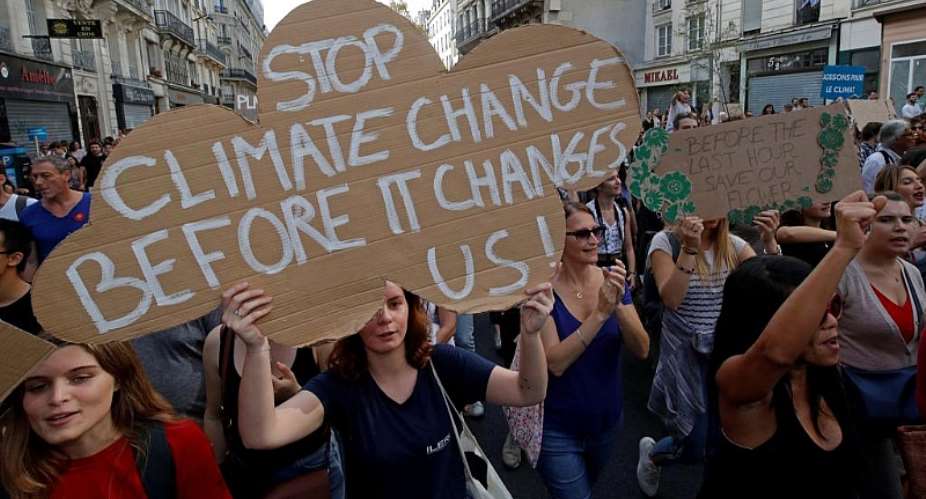13 March 2019, Accra – Government officials, policy makers, public and private actors from across the world will gather from 18 to 22 March in Accra, Ghana for the 2019 Africa Climate Week (ACW 2019).
In Accra, representatives of the United Nations Development Programme (UNDP), the United Nations Framework Convention on Climate Change (UNFCCC), and the World Bank will join investors and other key stakeholders to discuss how to advance national climate action plans, also known as Nationally Determined Contributions (NDCs).
The event will showcase the role of future carbon markets in enhancing climate action towards the goal of sustainable development and seek to facilitate implementation of African countries’ NDCs under the 2015 Paris Agreement on climate change and SDG 13 (climate action), among other Goals.
One of the highlights of ACW2019 will be Ghana’s NDC Investment Forum organized by the Government of Ghana and UNDP in collaboration with UNFCCC.
The aim of the two-day forum is to discuss how to crowd-in private sector investment for climate projects in Ghana that are financially viable, and to present potential projects to deliver the climate solutions that Ghana pledged in their NDCs.
Africa Climate Week will lay the groundwork for the upcoming UN Secretary-General’s Climate Summit scheduled to take place during the 73rd General Assembly in September 2019.
The Ghana’s NDC Investment Forum
When: Monday 18 March – Tuesday 19 March 2019
Where: Accra International Conference Centre
Specific press conference session at 14:00 – 15:15, Day 1, 18th March – Accelerating Private Sector Investment
Expected participants:
- Prof. George Gyan Baffour, Minister of Planning, Government of Ghana
- Patricia Appiagye, Deputy Minister, Ministry of Environment, Science, Technology and Innovation (MESTI)
- John Pwamang, Acting Executive Director of Environmental Protection Agency (EPA)
- Alhassan Andani, Chief Executive of Stanbic Bank Ghana and President of the Ghana Association of Bankers (GAB)
- Dr. Arona Soumare, Principal Climate Change and Green Growth Officer, African Development Bank
- Paul Stevers, CEO Think Renewables Group
- Daniel Rossetto, Founder, Paris Climate Bond
- Albert Touna Mama, Resident Representative, International Monetary Fund
- Ibrahim Peghouma, Senior Regional Energy/Environment Officer for West Africa, United Nations High Commissioner for Refugees (UNHCR) Ghana
- Gita Honwana Welch, Resident Representative, UNDP Ghana
About UNDP: UNDP partners with people at all levels of society to help build nations that can withstand crisis, and drive and sustain the kind of growth that improves the quality of life for everyone. On the ground in some 170 countries and territories, we offer a global perspective and local insight to help empower lives and build resilient nations.
About the World Bank: The World Bank (International Bank for Reconstruction and Development, IBRD), rated Aaa/AAA (Moody’s/S&P), is an international organization. Created in 1944, it is the original member of the World Bank Group and operates as a global development cooperative owned by 189 nations. The World Bank provides loans, guarantees, risk management products, and advisory services to middle-income and other creditworthy countries to support the Sustainable Development Goals and to end extreme poverty and promote shared prosperity. It also provides leadership to coordinate regional and global responses to development challenges. The World Bank has been issuing sustainable development bonds in the international capital markets for over 70 years to fund programs and activities that achieve a positive impact.
About UNFCCC: The UNFCCC secretariat (UN Climate Change) was established in 1992 when countries adopted the United Nations Framework Convention on Climate Change (UNFCCC). With the subsequent adoption of the Kyoto Protocol in 1997 and the Paris Agreement in 2015, Parties to these three agreements have progressively reaffirmed the secretariat’s role as the United Nations entity tasked with supporting the global response to the threat of climate change.





 Akufo-Addo commissions Phase II of Kaleo solar power plant
Akufo-Addo commissions Phase II of Kaleo solar power plant
 NDC panics over Bawumia’s visit to Pope Francis
NDC panics over Bawumia’s visit to Pope Francis
 EC blasts Mahama over “false” claims on recruitment of Returning Officers
EC blasts Mahama over “false” claims on recruitment of Returning Officers
 Lands Minister gives ultimatum to Future Global Resources to revamp Prestea/Bogo...
Lands Minister gives ultimatum to Future Global Resources to revamp Prestea/Bogo...
 Wa Naa appeals to Akufo-Addo to audit state lands in Wa
Wa Naa appeals to Akufo-Addo to audit state lands in Wa
 Prof Opoku-Agyemang misunderstood Bawumia’s ‘driver mate’ analogy – Miracles Abo...
Prof Opoku-Agyemang misunderstood Bawumia’s ‘driver mate’ analogy – Miracles Abo...
 EU confident Ghana will not sign Anti-LGBTQI Bill
EU confident Ghana will not sign Anti-LGBTQI Bill
 Suspend implementation of Planting for Food and Jobs for 2024 - Stakeholders
Suspend implementation of Planting for Food and Jobs for 2024 - Stakeholders
 Tema West Municipal Assembly gets Ghana's First Female Aircraft Marshaller as ne...
Tema West Municipal Assembly gets Ghana's First Female Aircraft Marshaller as ne...
 Dumsor is affecting us double, release timetable – Disability Federation to ECG
Dumsor is affecting us double, release timetable – Disability Federation to ECG
